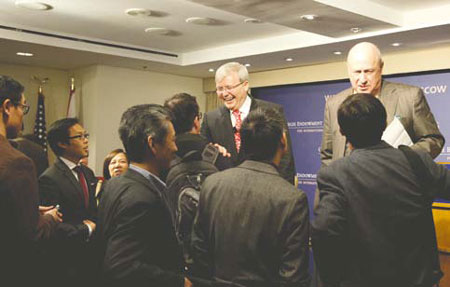Rudd pitches US-China strategy plan
Updated: 2013-04-03 11:27
By Joseph Boris in Washington (China Daily)
|
||||||||
|
Former Australian prime minister Kevin Rudd (center) talks with audience members after a seminar on a proposed strategic roadmap for China-US relations at the Carnegie Endowment for International Peace in Washington on Tuesday. Sun Chenbei / China Daily |
There exists "a unique window of opportunity" for the United States and China to pursue cooperation that could fulfill new Chinese leader Xi Jinping's call for a "new type of great-power relationship", a former Australian prime minister said.
Kevin Rudd, prime minister of Australia from 2007 to 2010 and currently a member of its Parliament, told a Washington think-tank audience on Tuesday that a new framework for cooperation could help overcome a "widening" gap in trust between the US and China while reducing the risk of conflict in hotspots such as the Korean Peninsula.
"Escalating tensions on the Korean Peninsula may in fact require a new level of strategic discourse in the US-China relationship sooner rather than later," said Rudd, who spoke at the Carnegie Endowment for International Peace a day after meeting in Beijing with Foreign Minister Wang Yi.
Last week, Rudd gave a speech to military officers at the PLA National Defense University.
He called on US President Barack Obama to take "at face value" an idea Xi expressed as China's vice-president during a visit to the US in February 2012. Xi at the time called for a "new type of great-power relationship for the 21st century".
Since Xi was named president in March, the "great power" formulation has made its way into China's foreign-policy establishment, Rudd said. He said he was "heartened" by Obama's post-election phone call to Xi, in which the US leader offered "to build a new type of relationship based on healthy competition" - a statement that has been noted by analysts and scholars in Beijing.
Obama's administration, Rudd said, should turn Xi's concept "into a work program for a series of regular summits between the two leaders", adding that discourse at the highest levels of government is necessary to further ties.
The former leader described Xi as "a leader that the United States can do business with" and praised him as "politically self-confident, given both his personal and family pedigrees, both on the military and economic-reform front".
"(Xi) has a very personal interest attached to the future of this relationship. He believes his presidency will be judged by it, in part," Rudd said.
Rudd recalled "many evolutions" in US-China relations since the 1949 founding of the People's Republic of China, from Cold War containment to Washington's admonitions that Beijing abide by international rules. He said it was now time for the US to modify its "hedging strategy" on China - accepting the reality of competition while bracing for the possibility of conflict - in the hope that enhanced cooperation in non-security areas leads to broader joint efforts and a bridging of the "trust deficit" that has long characterized the relationship.
Rudd said his policy proposal was grounded in political reality and attention to core Chinese interests.
"The reality is that core strategic concepts and interests between China and the United States remain. The creative challenge, however, is how to 'manage down' these areas of potential conflict while 'managing up' cooperation in other political and security domains," he said.
A new plan for cooperation would have to begin with the US, Rudd said.
"The truth is that if a new strategic roadmap for China-US relations is to be developed, the initiative is going to have to come from the Obama administration itself. Chinese bureaucracy is characterized by policy inertia; there are no rewards in the Chinese system for sticking your neck out by advancing a bold new strategic direction for the Chinese leadership on something as sensitive as the US relationship," he explained.
While there are no guarantees that such an overture would pay dividends for Washington, the alternative "is to allow strategic drift to set in ultimately trending toward conflict and even war", Rudd said. While a new framework wouldn't automatically resolve all tensions in the complex, multi-layered relationship, trust established through frequent meetings between the US and Chinese presidents would likely reduce tensions.
"When push comes to shove, I doubt that the Chinese will allow the possibility of a new period of strategic cooperation between the United States and China to flounder on the question of whether Chinese core interests included or excluded the South China Sea," he said.
Rudd, describing China as "very much a work in progress", said Obama would do well to invite Xi to Camp David, the Maryland retreat where US presidents have sometimes hosted diplomatic meetings, for a weekend of informal talks.
josephboris@chinadailyusa.com
(China Daily 04/03/2013 page8)

 In Photos: 7.0-magnitude quake hits Sichuan
In Photos: 7.0-magnitude quake hits Sichuan
 Li Na on Time cover, makes influential 100 list
Li Na on Time cover, makes influential 100 list
 FBI releases photos of 2 Boston bombings suspects
FBI releases photos of 2 Boston bombings suspects
 World's wackiest hairstyles
World's wackiest hairstyles
 Sandstorms strike Northwest China
Sandstorms strike Northwest China
 Never-seen photos of Madonna on display
Never-seen photos of Madonna on display
 H7N9 outbreak linked to waterfowl migration
H7N9 outbreak linked to waterfowl migration
 Dozens feared dead in Texas plant blast
Dozens feared dead in Texas plant blast
Most Viewed
Editor's Picks

|

|

|

|

|

|
Today's Top News
Live report: 7.0-magnitude quake hits Sichuan, heavy casualties feared
Boston suspect cornered on boat
Cross-talk artist helps to spread the word
'Green' awareness levels drop in Beijing
Palace Museum spruces up
First couple on Time's list of most influential
H7N9 flu transmission studied
Trading channels 'need to broaden'
US Weekly

|

|








